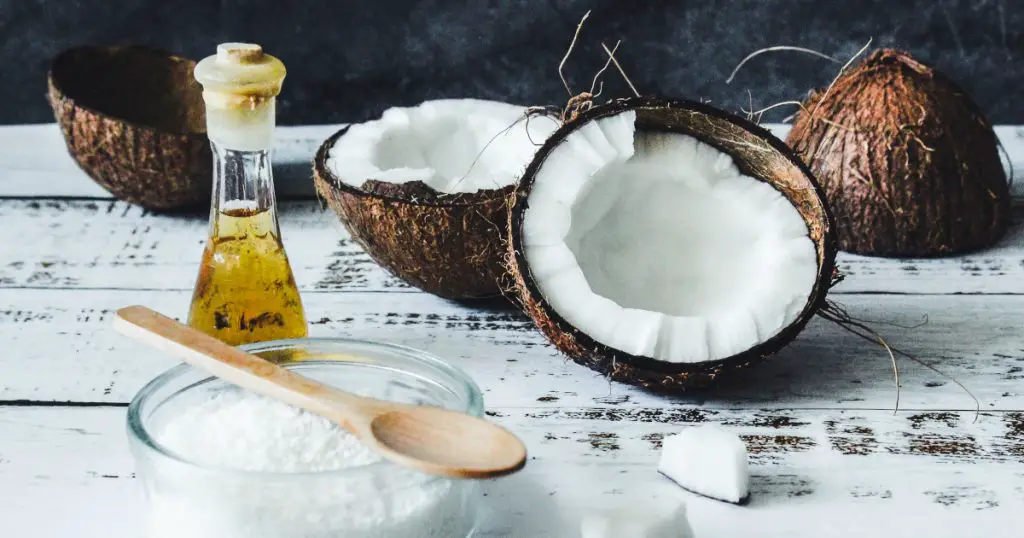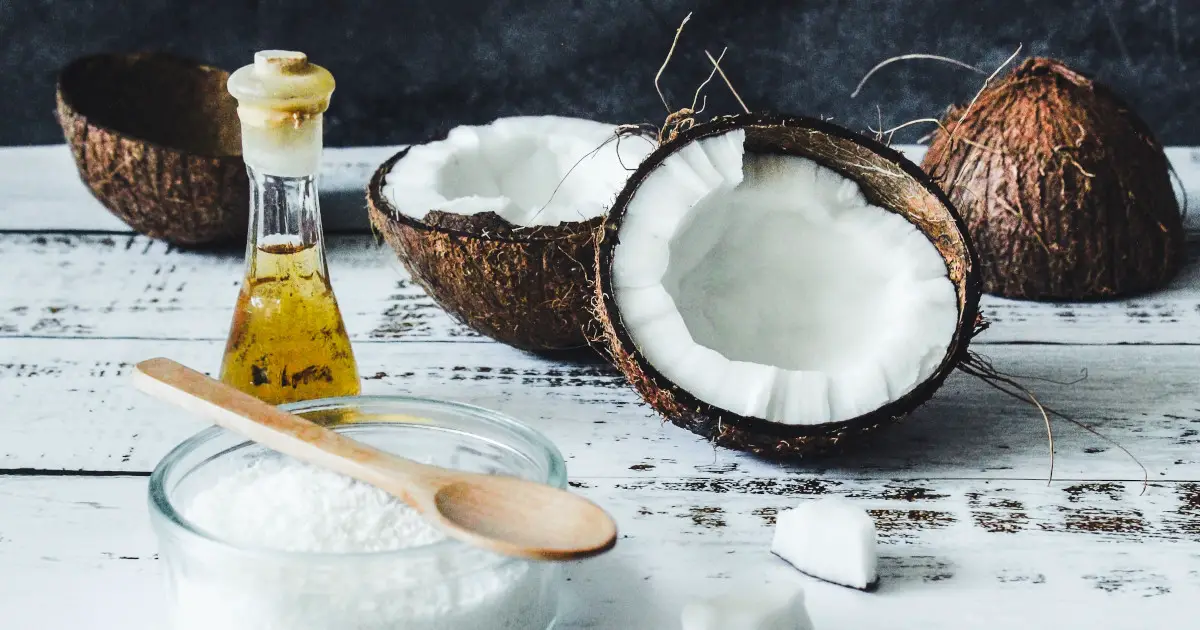Last Updated on: 16th November 2023, 07:58 pm

Do any search around the Keto diet and you’re likely to see MCT oil come up.
If (like me) you also look for pictures and you’ll come across coconuts.
So, keto and coconuts.
Sounds healthy enough.
Sounds simple enough.
And it has a whole range of benefits.
It just might be worth digging into.
Let’s go.
From a health perspective, Medium Chain Triglycerides (MCT) not only provide us with the essential fatty acids, but, more importantly, it also reduces body fat accumulation, improves insulin resistance and plays an important role in clinical nutritional treatment.
Reviews of medium- and long-chain triglyceride with respect to nutritional benefits and digestion and absorption behavior
As with a lot of diet information, things can quickly get technical. There are a bunch of studies showing how MCT oil can have many health benefits, but these can be boiled down into four main areas:
If you like, you can stop right here with the learning and take a look at how to get hold of some.
But if you’re curious, read on to discover what MCT Oil is, and more importantly, how can it help you – even if you’re not on a Keto diet.
MCT = Medium-Chain Triglycerides
The letters MCT stand for medium-chain triglycerides. Let’s give it a bit of context.
Where do Tryglicerides fit in?
Tryglicerides are a type of fat that can give your body energy.
Wait, aren’t they dangerous?
Like all types of fats, triglycerides can be classified as healthy fats, dangerous fats, or a combination of both. If you’re over 40 and been to the doctor, it’s quite possible you’ve had a test for triglyceride levels.
So yes, high triglyceride levels can be dangerous – they often associated with high cholesterol, heart problems or diabetes. But triglycerides like salmon and mackerel, or flax seeds and walnuts can actually lower trigliceride levels. It’s important to know that when it comes to danger levels, not all trilglycerides are equal.
Short, Medium and Long Chain Fatty acids
MCTs are a form of saturated fatty acid. As their name suggests, they are “medium” length, putting them right in the middle of short chain tryglicerides and long chain triglicerides acids. The table below has a quick overview of the main differences.
SCT v MCT Oil (and LCT too)
| Short Chain | Medium Chain | Long Chain | |
|---|---|---|---|
| Carbon Atoms (length) | <6 | 6-12 | 13+ |
| How is it absorbed | Produced in body | Directly through the liver | Bile and enzymes |
| Benefits | Reduce inflammation, regulate blood sugar | Easily digested into ketones for immediate use as energy | Need to bind to proteins so are harder to absorb, can be stored as fat |
| Sources | Grass fed butter and dairy products, produced by body | Dairy products, coconut oil, palm oil | Most common type of fat, found in olive oil, animal meats, fish, dairy, nuts |
Long Chain Fatty Acids
You might have heard of triglycerides, most likely relating to supplements you might already be taking healthy fats such as fish oil to get your Omega 3. Omega-3s are essential fatty acids and play huge roles in fighting health issues ranging from cardiovascular disease to brain, joint, and skin health, but since the body can’t produce them, we have to consume them in foods or supplements.
On the other hand, long-chain fatty acids also include things like bread and bagels, candy, juice, corn syrup and sugar. These have all been shown to raise triglyceride levels. Those on a keto diet will also notice that these same triglycerides are on the list of what not to eat on a keto diet.
So depending on their type, long-chain fatty acids can be good or bad for you. But what they aren’t good at is providing quick energy. Remember, they are long-chain fatty acids; their size makes them hard for the body to break down and digest for energy.
Medium Chain Fatty Acids
Medium chain triglycerides on the other hand are good for providing energy. Because they are shorter, they are easier for the body to process. They enter directly into circulation for immediate energy or as ketones, which is what we’re all after in a keto diet.
Types of MCTs
Like triglycerides, not all MCTs are created equal. There are four types of MCTs, so if you’re looking at the label on a supplement, there are a couple to watch for: caprylic acid (C8) or capric acid (C10) do most of the good things you’re after, but these are also the ones more likely to cause gut problems such as diarrhoea, especially when you’re taking them for the first time.
- C6: caproic acid – as the shortest of the MCTs, this is quickly converted into ketones, however it has a bitter taste and has been the most associated with gut problems
- C8: caprylic acid – probably the pick of the MCT range. It’s odorless and flavorless, mild on the stomach and great for suppressing hunger but also hard to produce
- C10: capric acid – more common than caprylic acid, its longer (10 atom) structure means it’s slightly less efficient to convert to energy. It also has immunity benefits.
- C12: lauric acid – the main component of coconut oil. Lauric acid is also popular for treating viral infections.
Short Chain Fatty Acids
So if long chain can be dangerous, and medium chain is better, wouldn’t short chain be even better yet?
The answer (annoyingly) “kind of”. SCTs are made in the body when it processes fiber, especially from whole-grain plant-based foods. They play an important role in promoting gut health (including providing cellular energy for your gut) and immunity
While there are an increasing amount of SCT oil research being done, and more supplements are offering it, MCTs probably hold the middle ground between being easier to absorb than long chain and proven effectiveness as a food substitute when it comes to supplementing a keto diet.
MCTs can help you stay in ketosis
There is a lot of research around how MCT oil can increase the amount of keytones in the blood and help you stay in ketosis.
MCT supplementation is demonstrably ketogenic … and allows the achievement of ketosis with lower amounts of lipids (and concomitantly higher levels of protein and carbohydrate)
The Effect of Medium Chain Triglycerides on Time to Nutritional Ketosis and Symptoms of Keto-Induction in Healthy Adults: A Randomised Controlled Clinical Trial
Another study5 – and one which those of us on a keto diet might think has some cheating involved – has evidence that MCTs help you stay in ketosis with and without carbohydrates.
Resassuringly, the study also found that the best results came from those either on a keto diet, or, to a lesser extent, following a form of intermittent fasting, such as a 16 hour window.
For example
MCTs can help with digestive problems
MCTs can be especially beneficial for people who have a hard time digesting other types of fat, whether the problem is from absorbing or other gut problems including Crohn’s disease, leaky gut or other issues.6
When it comes to digestion, MCTs aren’t completely without problems though. Users have reported stomach pain, dihorreah. So like when taking anything new, start slowly – take small amounts to start (maybe a tablespoon), ideally with other foods to help absorbtion. Consider starting with a natural, rather than a refined form.
Coconut oil is ideal, while it doesn’t have the most effective balance of MCTs (it has more lauric acid, the longer chain of the four types of MCT – see below), its natural composition more than makes up for that when you’re starting out
MCTs and weight loss
As we’ve said above, MCT oil is in a lot of keto supplements and keto dieters often use it as part of their regimen. And while we’d stand by our recommendation to look at coconut oil as an easy way to get started, there are more refined and concentrated versions included in supplements for a good reason.
MCTs are oxidised in the liver, this means they are oxidised quickly, and that means your body expends more energy, and potentially lose weight.7
- Burn more energy – Studies have shown the body burns more energy when you take MCTs. The reason for this is when you burn MCTs for fuel, your body temperature increases at the same time, and as we all know, more heat means more energy is being used – essentially you’re getting a free boost. The results are the same for both men8 and women9.
- Make you feel “full” faster and for longer – One recent study concluded that taking MCT oil had the effect of “reducing food intake compared to the coconut and control oil… The MCT also increased fullness over the three hours after breakfast compared to the control and coconut oils.”10
- Decrease the size of fat deposits – A study from 2020 concluded that in the long term, MCTs can “suppresses body weight and fat mass gain” by inhibiting Gastric inhibitory polypeptide (GIP)11, but the important thing to know is it
The benefits of MCTs
So remember, MCTs are more than coconuts. They have proven benefits for getting into ketosis, losing weight and digestive health.
So whether it’s cracking open a jar of coconut oil, or looking at the latest supplement, MCTs should be playing a part in your keto lifestyle.
What next for your keto lifestyle?
Theory is great, but it needs to put it into action. Take a look at our guide to the beef and butter fast, just one of the ways you can get a quick start in keto.

Nick has been involved in nutrition for over 20 years, at one stage weighing over 110kg (17 stone) and after experimenting with a combination of diet and exercise, has bought this back to around 80kg (12.5 stone). He’s currently running-obsessed, logging over 50 kilometres (30 miles) a week, and has been working in the nutracutical and supplements space for the last 5 years. He believes health and wellness start with the individual – you have to know what you’re doing, and have the passion to stick with it to get the results you want.
- Relation of ketosis to metabolic changes induced by acute medium-chain triglyceride feeding in rats [↩]
- The Use of Medium-Chain Triglycerides in Gastrointestinal Disorders [↩]
- Medium-Chain Triglycerides Increase Energy Expenditure and Decrease Adiposity in Overweight Men [↩]
- Coconut oil has less satiating properties than medium chain triglyceride oil [↩]
- Ketosis After Intake of Coconut Oil and Caprylic Acid—With and Without Glucose: A Cross-Over Study in Healthy Older Adults [↩]
- The Use of Medium-Chain Triglycerides
in Gastrointestinal Disorders [↩] - Physiological effects of medium-chain triglycerides: potential agents in the prevention of obesity [↩]
- Thermic effect of medium-chain and long-chain triglycerides in man [↩]
- The thermic effect is greater for structured medium- and long-chain triacylglycerols versus long-chain triacylglycerols in healthy young women [↩]
- Coconut oil has less satiating properties than medium chain triglyceride oil [↩]
- Medium-chain triglyceride diet stimulates less GIP secretion and suppresses body weight and fat mass gain compared with long-chain triglyceride diet [↩]
